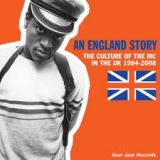
The Daily Telegraph talks about An English Story, a reggae compilation on Soul Jazz Records that attempts to document dancehall’s lasting influence on popular British music. Link [via]
Jamaican MCing – also known as toasting, chatting, and, confusingly, deejaying – has been around since the late Sixties. As Jamaica’s DJs invested in ever grander and louder equipment, the sound systems sought to outdo each other with both raw power and exclusive material. This led not only to the invention of the modern remix, but also the rise of the live MC, whose job was to enliven the crowd and insult rivals.
Jamaican expats in New York took these elements and turned them into something new: hip-hop. In Britain, though, their localisation was slower, more subtle, and truer to their roots. “You kind of forget, in England, that though reggae isn’t really mainstream, it is all around,” says Myddelton. “The places where reggae was really important – Southampton, Birmingham, London – are the places where things like garage and dubstep took off later.” It’s no coincidence: grime, jungle, and other dance scenes also owe the bulk of their DNA to the conventions of the reggae sound system.
An English Story – Information
The development of Black music in the United Kingdom owes much to the influence of Jamaican and US music on each succesive generation of Carribean immigrants to the UK – from Windrush to the present day. UK based MC’s take these influences, mix them up with local references and styles thus creating an identity of Black British culture. This is constantly evolving not just musically but also in terms of each subsequent generation’s relationship to British society. As Tricky put it in Massive Attack’s Blue Lines, of “English upbringing, background Caribbean”
An England Story shows the links and musical path from the arrival of UK Dancehall and Soundsystems in the early 1980s, through successive musical movements such as Jungle, UK Hip-Hop, up to today’s Garage, Grime and Dubstep.
The global pre-eminence of American hip hop means that music like grime and UK hip hop is often seen as a form of rap, whereas it owes as much to reggae music and culture as it does to any American influence. Black music in Britain has fashioned its own identity in contrast to that of America, Africa, or elsewhere, by drawing on the unique relationship that the UK has with the Caribbean. As Rodney P (of celebrated 80s UK Hip-Hop group London Posse) says:
“This is a UK thing, it’s hip hop and it’s reggae and we do reggae – and those Americans don’t know about that”.



